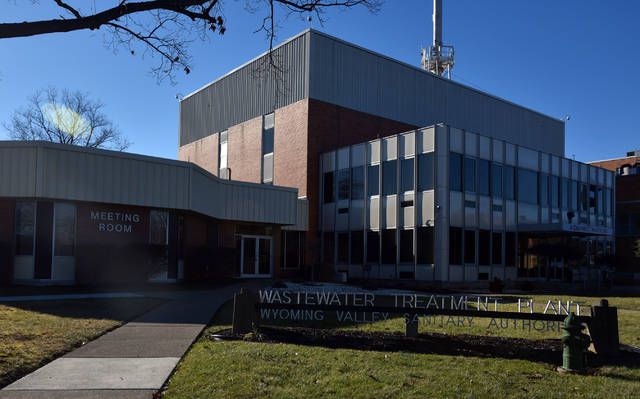Click here to subscribe today or Login.
Lehman Township will remain in the Wyoming Valley Sanitary Authority’s regional stormwater program by paying $28,037 per year under a special agreement the authority approved Tuesday.
Township property owners won’t be required to pay a stormwater fee based on nonabsorbent impervious area and will receive refunds for fees they paid to date, the agreement said.
Like 31 other municipalities, the township had signed up for the authority-run program to comply with a federal mandate to reduce sediment, nitrogen and phosphorus in the Susquehanna River and Chesapeake Bay. However, Lehman later obtained a state Department of Environmental Protection (DEP) waiver saying the municipality doesn’t have to meet the waiver, at least not for five years.
Township officials asked the authority to work out a different payment arrangement to stay in the program in a non-mandatory category because they are concerned it would be too costly to bring the municipality into compliance on its own if the waiver is withdrawn in five years.
The township’s new annual $28,037 payment for five years is based on calculations of its share of costs for administrative, legal and engineering services, program start-up and expenses to return stormwater fee payments to its residents, authority documents said.
The owners of 1,209 township properties have collectively paid $110,195 in fees this year to date, according to the latest authority report through Sept. 11.
In total, the authority has collected $6.63 million in fee payments from 67,777 properties so far this year. Bills were issued on 76,660 properties, which means 88.4 percent have paid, the report says.
Authority officials have said the modified agreement makes sense because it would avoid a potential legal battle for the township to get out of the regional pact and won’t require the rest of the group to shoulder expenses for the township to comply with the mandate.
Lehman officials had said they considered a waiver in fall 2017 but did not believe they would be successful falling within 5 miles of an impaired waterway. However, their application filed in February was approved by the state because they supplied new population analysis and research showing the portion of East Fork Harveys Creek that runs through the township is not impaired.
The mandate applies to municipalities requiring MS4 (municipal separate storm sewer system) permits because they have both urbanized areas determined by U.S. Census data and separate storm sewer systems that discharge directly into waterways without first being treated.
Other business
In other business Tuesday, authority board Chairman Sam Guesto thanked state legislators for securing a $50,000 state Act 13 grant for the design and construction of stream restoration along Spring Run in Hanover Township between West Liberty Street and Solomon Creek.
It’s among several pilot pollution reduction projects the authority is advancing as the authority awaits DEP approval of its regional pollution reduction plan.
The Spring Run project will include riparian buffer plantings and reduce sediments and nutrients in both Spring Run and Solomon Creek, officials said.
State Sen. John Yudichak, D-Plymouth Township, said in a release about the grant Tuesday that he has worked with the entire Northeast Legislative delegation to help reduce regional stormwater program costs.
U.S. Rep. Dan Meuser, R-Dallas, also issued his own release Tuesday, saying he met with U.S. Environmental Protection Agency representatives Monday to discuss the MS4 program’s impact on the region.
“I expressed the deep concerns and grievances from the people of the Ninth District and how inequitable this stormwater situation seems to be all over the state and basin. This initiative must be transparent and equitable before constituents are asked to pay a fee,” Meuser said in the release.
He said he asked the EPA to reevaluate current guidelines and municipal compliance costs to seek a way to “act environmentally consciously while also not being financially burdensome to the people.”
State Sen. Lisa Baker weighed in on the matter in Meuser’s release, saying there is a need for a “comprehensive state strategy and dedicated resources.” Processes and terminology also must be “more clearly defined” as the EPA reviews the state’s proposed compliance plan, she wrote.
“People are understandably frustrated and confused,” said Baker, R-Lehman Township.
Also in the release was state Rep. Karen Boback, R-Harveys Lake, who said the federal mandate must come with federal funds.
“The rain water tax is taking a toll on all of us,” she wrote.
In total, more than 2.37 million pounds of sediment, phosphorus and nitrogen must be eliminated through the sanitary authority’s regional program, its plan said. In addition to street sweeping, catch basin cleaning and the required extensive mapping of stormwater systems, the authority has proposed a series of water detention basin, stream restoration, stormwater park and rain garden projects to comply with the mandate.





